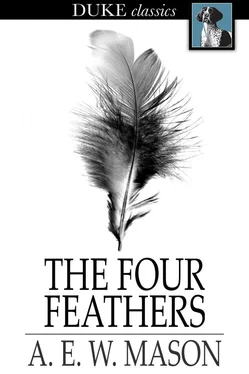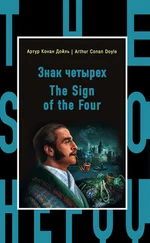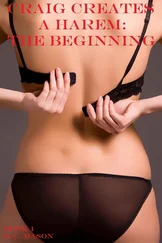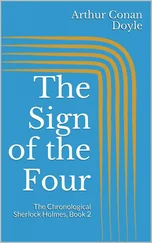A. Mason - The Four Feathers
Здесь есть возможность читать онлайн «A. Mason - The Four Feathers» весь текст электронной книги совершенно бесплатно (целиком полную версию без сокращений). В некоторых случаях можно слушать аудио, скачать через торрент в формате fb2 и присутствует краткое содержание. Жанр: Исторические приключения, на английском языке. Описание произведения, (предисловие) а так же отзывы посетителей доступны на портале библиотеки ЛибКат.
- Название:The Four Feathers
- Автор:
- Жанр:
- Год:неизвестен
- ISBN:нет данных
- Рейтинг книги:5 / 5. Голосов: 1
-
Избранное:Добавить в избранное
- Отзывы:
-
Ваша оценка:
- 100
- 1
- 2
- 3
- 4
- 5
The Four Feathers: краткое содержание, описание и аннотация
Предлагаем к чтению аннотацию, описание, краткое содержание или предисловие (зависит от того, что написал сам автор книги «The Four Feathers»). Если вы не нашли необходимую информацию о книге — напишите в комментариях, мы постараемся отыскать её.
The Four Feathers — читать онлайн бесплатно полную книгу (весь текст) целиком
Ниже представлен текст книги, разбитый по страницам. Система сохранения места последней прочитанной страницы, позволяет с удобством читать онлайн бесплатно книгу «The Four Feathers», без необходимости каждый раз заново искать на чём Вы остановились. Поставьте закладку, и сможете в любой момент перейти на страницу, на которой закончили чтение.
Интервал:
Закладка:
"It is a long time since we bathed in Sandford Lasher," said Durrance.
"Or froze in the Easter vacations in the big snow-gully on Great End," returned Feversham. Both men had the feeling that on this morning a volume in their book of life was ended; and since the volume had been a pleasant one to read, and they did not know whether its successors would sustain its promise, they were looking backward through the leaves before they put it finally away.
"You must stay with us, Jack, when you come back," said Feversham.
Durrance had schooled himself not to wince, and he did not, even at that anticipatory "us." If his left hand tightened upon the thongs of his reins, the sign could not be detected by his friend.
"If I come back," said Durrance. "You know my creed. I could never pity a man who died on active service. I would very much like to come by that end myself."
It was a quite simple creed, consistent with the simplicity of the man who uttered it. It amounted to no more than this: that to die decently was worth a good many years of life. So that he uttered it without melancholy or any sign of foreboding. Even so, however, he had a fear that perhaps his friend might place another interpretation upon the words, and he looked quickly into his face. He only saw again, however, that puzzling look of envy in Feversham's eyes.
"You see there are worse things which can happen," he continued; "disablement, for instance. Clever men could make a shift, perhaps, to put up with it. But what in the world should I do if I had to sit in a chair all my days? It makes me shiver to think of it," and he shook his broad shoulders to unsaddle that fear. "Well, this is the last ride. Let us gallop," and he let out his horse.
Feversham followed his example, and side by side they went racing down the sand. At the bottom of the Row they stopped, shook hands, and with the curtest of nods parted. Feversham rode out of the park, Durrance turned back and walked his horse up toward the seats beneath the trees.
Even as a boy in his home at Southpool in Devonshire, upon a wooded creek of the Salcombe estuary, he had always been conscious of a certain restlessness, a desire to sail down that creek and out over the levels of the sea, a dream of queer outlandish countries and peoples beyond the dark familiar woods. And the restlessness had grown upon him, so that "Guessens," even when he had inherited it with its farms and lands, had remained always in his thoughts as a place to come home to rather than an estate to occupy a life. He purposely exaggerated that restlessness now, and purposely set against it words which Feversham had spoken and which he knew to be true. Ethne Eustace would hardly be happy outside her county of Donegal. Therefore, even had things fallen out differently, as he phrased it, there might have been a clash. Perhaps it was as well that Harry Feversham was to marry Ethne-and not another than Feversham.
Thus, at all events, he argued as he rode, until the riders vanished from before his eyes, and the ladies in their coloured frocks beneath the cool of the trees. The trees themselves dwindled to ragged mimosas, the brown sand at his feet spread out in a widening circumference and took the bright colour of honey; and upon the empty sand black stones began to heap themselves shapelessly like coal, and to flash in the sun like mirrors. He was deep in his anticipations of the Soudan, when he heard his name called out softly in a woman's voice, and, looking up, found himself close by the rails.
"How do you do, Mrs. Adair?" said he, and he stopped his horse. Mrs. Adair gave him her hand across the rails. She was Durrance's neighbour at Southpool, and by a year or two his elder-a tall woman, remarkable for the many shades of her thick brown hair and the peculiar pallor on her face. But at this moment the face had brightened, there was a hint of colour in the cheeks.
"I have news for you," said Durrance. "Two special items. One, Harry Feversham is to be married."
"To whom?" asked the lady, eagerly.
"You should know. It was in your house in Hill Street that Harry first met her; and I introduced him. He has been improving the acquaintance in Dublin."
But Mrs. Adair already understood; and it was plain that the news was welcome.
"Ethne Eustace!" she cried. "They will be married soon?"
"There is nothing to prevent it."
"I am glad," and the lady sighed as though with relief. "What is your second item?"
"As good as the first. I go out on General Graham's staff."
Mrs. Adair was silent. There came a look of anxiety into her eyes, and the colour died out of her face.
"You are very glad, I suppose," she said slowly.
Durrance's voice left her in no doubt.
"I should think I was. I go soon, too, and the sooner the better. I will come and dine some night, if I may, before I go."
"My husband will be pleased to see you," said Mrs. Adair, rather coldly. Durrance did not notice the coldness, however. He had his own reasons for making the most of the opportunity which had come his way; and he urged his enthusiasm, and laid it bare in words more for his own benefit than with any thought of Mrs. Adair. Indeed, he had always rather a vague impression of the lady. She was handsome in a queer, foreign way not so uncommon along the coasts of Devonshire and Cornwall, and she had good hair, and was always well dressed. Moreover, she was friendly. And at that point Durrance's knowledge of her came to an end. Perhaps her chief merit in his eyes was that she had made friends with Ethne Eustace. But he was to become better acquainted with Mrs. Adair. He rode away from the park with the old regret in his mind that the fortunes of himself and his friend were this morning finally severed. As a fact he had that morning set the strands of a new rope a-weaving which was to bring them together again in a strange and terrible relationship. Mrs. Adair followed him out of the park, and walked home very thoughtfully.
Durrance had just one week wherein to provide his equipment and arrange his estate in Devonshire. It passed in a continuous hurry of preparation, so that his newspaper lay each day unfolded in his rooms. The general was to travel overland to Brindisi; and so on an evening of wind and rain, toward the end of July, Durrance stepped from the Dover pier into the mail-boat for Calais. In spite of the rain and the gloomy night, a small crowd had gathered to give the general a send-off. As the ropes were cast off, a feeble cheer was raised; and before the cheer had ended, Durrance found himself beset by a strange illusion. He was leaning upon the bulwarks, idly wondering whether this was his last view of England, and with a wish that some one of his friends had come down to see him go, when it seemed to him suddenly that his wish was answered; for he caught a glimpse of a man standing beneath a gas-lamp, and that man was of the stature and wore the likeness of Harry Feversham. Durrance rubbed his eyes and looked again. But the wind made the tongue of light flicker uncertainly within the glass; the rain, too, blurred the quay. He could only be certain that a man was standing there, he could only vaguely distinguish beneath the lamp the whiteness of a face. It was an illusion, he said to himself. Harry Feversham was at that moment most likely listening to Ethne playing the violin under a clear sky in a high garden of Donegal. But even as he was turning from the bulwarks, there came a lull of the wind, the lights burned bright and steady on the pier, and the face leaped from the shadows distinct in feature and expression. Durrance leaned out over the side of the boat.
"Harry!" he shouted, at the top of a wondering voice.
But the figure beneath the lamp never stirred. The wind blew the lights again this way and that, the paddles churned the water, the mail-boat passed beyond the pier. It was an illusion, he repeated; it was a coincidence. It was the face of a stranger very like to Harry Feversham's. It could not be Feversham's, because the face which Durrance had seen so distinctly for a moment was a haggard, wistful face-a face stamped with an extraordinary misery; the face of a man cast out from among his fellows.
Читать дальшеИнтервал:
Закладка:
Похожие книги на «The Four Feathers»
Представляем Вашему вниманию похожие книги на «The Four Feathers» списком для выбора. Мы отобрали схожую по названию и смыслу литературу в надежде предоставить читателям больше вариантов отыскать новые, интересные, ещё непрочитанные произведения.
Обсуждение, отзывы о книге «The Four Feathers» и просто собственные мнения читателей. Оставьте ваши комментарии, напишите, что Вы думаете о произведении, его смысле или главных героях. Укажите что конкретно понравилось, а что нет, и почему Вы так считаете.











